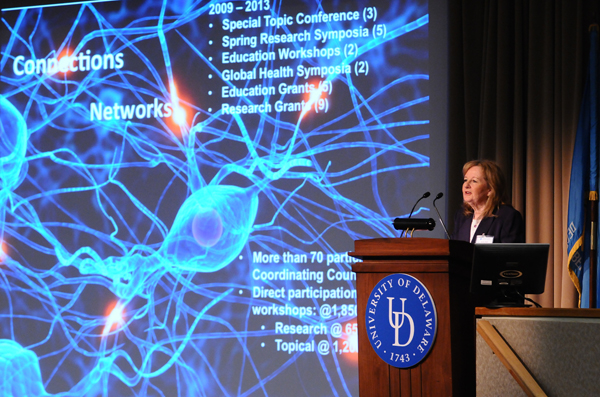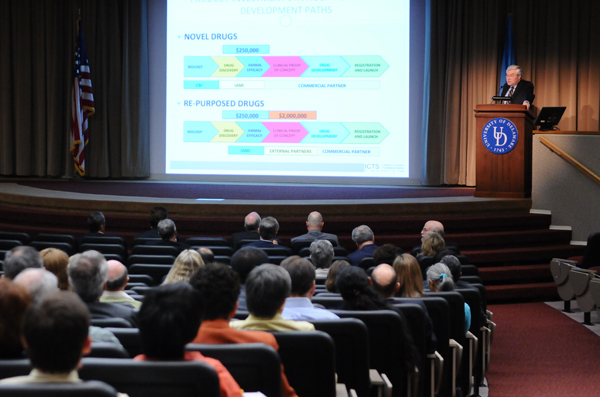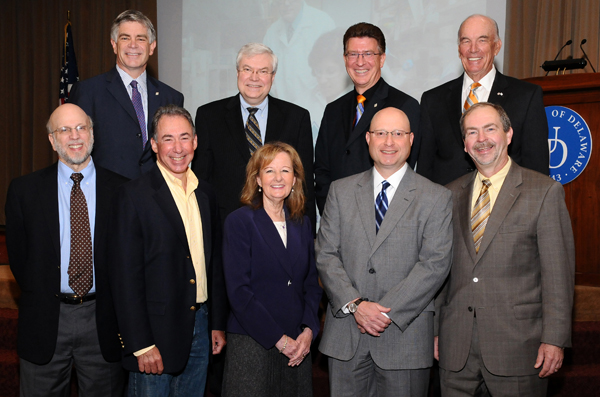


DHSA symposium
Event focuses on transitions toward clinical translational research
1:36 p.m., May 15, 2013--More than 150 academic and clinical researchers turned out for the Delaware Health Sciences Alliance’s fifth annual research symposium on Friday, May 10. Held at the University of Delaware, the symposium focused on “Transitions Toward Clinical Translational Research.”
UD President Patrick Harker welcomed attendees with a recap of some of the alliance’s accomplishments over the past five years.
Research Stories
Chronic wounds
Prof. Heck's legacy
“DHSA research teams have successfully competed for 26 network grants, totaling more than $60 million,” Harker said, “and proposals are pending for another $65 million to grow this network even further. Also, across Delaware, the volume of annual National Institutes of Health funding has grown six-fold over the past 20 years.”
Now, with a rapidly growing biomedical research culture established in Delaware, Harker said, “We hope to hear soon about some major new grants that will allow us to build on this platform of basic biomedical research and take it to the next level, with clinical and translational research that brings today’s inventions out of the laboratory and rapidly deploys them in the care of patients across our communities.”
Keynote speaker Raymond Hohl described his experience with the University of Iowa Institute for Clinical and Translational Sciences. The institute provides a strong research infrastructure comprising training, degree, and certificate programs; academic career development and mentoring programs; bench-to-bedside seminars; courses in ethics and scientific leadership; and services such as a high throughput screening facility and project management and support.
Hohl cited a number of compelling reasons for collaboration through Clinical and Translational Science Awards (CTSAs), including the need to leverage institutional resources and reduce duplicative efforts across research programs, provide infrastructures to enable innovative investigation, share institutional responsibilities in driving improvements in research efficiency, support the full spectrum of translational research, and share roles in catalyzing national research priorities.
Hohl’s talk was followed by presentations from Karl Steiner (UD) on the catalytic impact of the Delaware INBRE, by Dr. William Weintraub (Christiana Care) on the developing Delaware Clinical and Translational Research program, and by Dr. Scott Waldman (TJU), who outlined the plans for a new proposal to NIH for a CTSA. The attendees split up into several working groups for the remainder of the meeting to prepare outlines of sections for the proposed new effort.
The symposium poster session resulted in five projects being recognized with awards:
First place (tie)
- Shirin Moderal (Nemours/A.I. duPont Hospital for Children), “Dysregulation of Neuroendocrine Factors Contributes to Stem Cell Overpopulation in Colon Carcinomas”; and
- Joshua Davis (Christiana Care) and Jennifer Sims-Mourtada and Lynn Opdenaker (UD), “Sonic Hedgehog (SHH) Protects Prostate Cancer Cells from Bone Marrow Stromal Cell Induced Death.”
Second place (tie)
- Claudine Jurkovitz (Christiana Care), “Association Between Lack of Health Insurance and Risk of Death and ESRD: Results from the Kidney Early Evolution Program”; and
- Sonali Barwe, Sonalakshme Balasubramaniam, Anilkumar Gopalakrishnapillai, Ayyappan K. Rajasekaran (Nemours/A.I. duPont Hospital for Children), “Na,K-ATPase beta1-subunit is Required for Stability and Membrane Localization of NCX1.”
Third place
- Vignesh Viswanathan (UD), “MicroRNA-23b Contributes to Stem Cell Overpopulation in Colon Carcinomas.”
In addition, institutional updates were provided by Robert Laskowski (Christiana Care), Paul Kempinski (Nemours/A.I. duPont Hospital for Children), Richard Gozon (TJU), and Kathleen Matt (UD-DHSA).
About DHSA
The Delaware Health Sciences Alliance was established in 2009 with four founding partners — Christiana Care Health System, Nemours/Alfred I. duPont Hospital for Children, Thomas Jefferson University, and the University of Delaware.
The alliance enables partner organizations to collaborate and conduct cutting-edge biomedical research, to improve the health of Delawareans through access to services in the state and region, and to educate the next generation of health care professionals.
DHSA’s unique, broad-based partnership focuses on establishing innovative collaborations among experts in medical education and practice, health economics and policy, population sciences, public health, and biomedical sciences and engineering. For more information, visit DHSA on the web.
Article by Diane Kukich
Photos courtesy of Scott Ellis, Christiana Care










